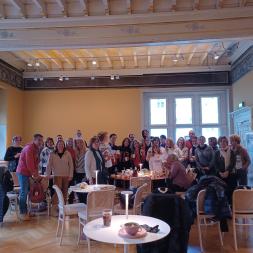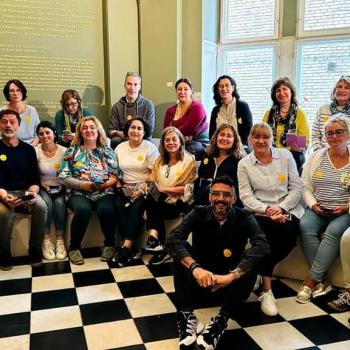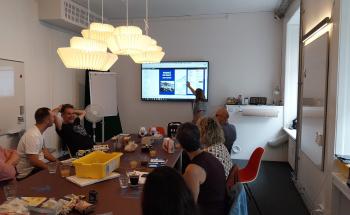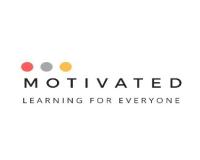
“Teaching Refugees and Migrants in my Classroom”
This course has been developed to support classroom teachers in order to expand their understanding of the experiences, skills and knowledge that current migrant and refugee populations bring to school, to establish effective teaching strategies for refugee and migrant students in mainstream classroom and to explore training programs and resources available to support them.
Description
Programme of training activities day-by-day:
MONDAY (Day 1)
Module 1:Welcome and registration; Getting to know each other: Introduction of the course members; Talking about the schedule of the course; Education of Refugees and Migrants in the country, where the course is held; FRAMEWORK FOR 21st CENTURY EDUCATION; Understanding reasons for migration; Migrants and Refugees: Myths and stereotypes; Key aspects of education for refugee and migrant children; Supporting Refugees and Migrants: Develop an understanding of government programs that support refugees and migrants in Europe.
TUESDAY (Day 2)
Module 2: Characteristics of Effective 21st century Teaching/Teachers; Challenges of refugee education; Effective and Innovative Teaching Methods: Project-Based Learning Strategies in the Classroom; Trauma-Informed Strategies for Supporting Refugee Students.
WEDNESDAY (Day 3)
Module 3: Workshop: Tips for Teachers: Supporting Refugees and Migrants in the Classroom - The importance of challenging discrimination and promoting inclusion and tolerance which foster collaborative learning; Establish positive relationships; Development Plan for integrating refugees and migrants in the school environment.
THURSDAY (Day 4)
Module 4: Workshop: A WELCOMING INCLUSIVE CLASSROOM: How to develop learners’ confidence, considering the languages they know and their cultures
FRIDAY (Day 5)
Module 5: Creating Refugee-friendly Schools and Making the curriculum accessible: Cooperative Learning Strategies; Teaching social skills for effective teamwork; Teacher–Centered Approach vs. Student–Centered Approach.
SATURDAY (Day 6)
Module 6: Outdoor activity –“Treasure Hunt”– In the shoes of our learners
SUNDAY (Day 7)
Module 7: Feedback, course evaluation and dissemination focus; Delivery of Certificates of Attendance.
IMPORTANT: PARTICIPANTS COULD ATTEND 5, 6, 7 OR MORE DAYS IN ACCORDANCE TO THEIR APPLICATION.
Learning objectives
Developing a greater knowledge and understanding of working with students with refugee and migrant background and ability to provide appropriate positive reinforcements to motivate these pupils; Ability to devise and implement strategies to promote social integration of refugee and migrant students; Gaining knowledge for effective teaching strategies by exchanging good practices among teachers and educators from different countries on various aspects and perceptions of marginalization and inclusion, insights and values about youth work with marginalized groups; Motivation and empowerment for active promotion of combating social exclusion in their activities by respecting values and principles for inclusion and proposed solutions and recommendations for challenges in their project management and fundraising; Promoting an open and creative training environment for non-formal learning; Getting familiar with the concept of resilience and empowerment; Improved competences in supporting empowering process with young people; Mastering new empowerment and resilience tools; Develop new local and European projects for inclusion, that are aimed at raising young people’s awareness of everyone’s responsibility in tackling poverty and marginalization as well as at promoting the inclusion of groups with fewer opportunities; Improved ability to facilitate group process; Develop the skill of creating a supportive environment that fosters teamwork; Raise understanding of communication process in the group and develop better communication skills; Increased awareness of own strong points and areas of development; Increased ability to support individuals who face difficulties in being part of a team; Enhance the skill of giving and receiving feedback; Deal with cultural differences inside the classroom and make the most out of cultural diversity; Embrace cultural diversity and best practices for integration; Develop and implement desegregation
Methodology & assessment
Certification details
At the end of the course, each participant will be awarded a Certificate of Attendance along with Europass Mobility.
Our certificates are in line with the Erasmus Quality Standards and so include the course's title, short description of its learning outcomes (if requested), dates, venue, the name of the course provider and the course director, number of training hours.
We support participants in every step of certification and validation of learning outcomes focusing specifically on European instruments and Erasmus+ requirements such as Learning Agreement, Quality Commitment and Europass mobility.
Pricing, packages and other information
-
Price:560Euro
Additional information
-
Language:English
-
Target audience ISCED:Primary education (ISCED 1)Lower secondary education (ISCED 2)Upper secondary education (ISCED 3)
-
Target audience type:TeacherHead Teacher / PrincipalPedagogical Adviser
-
Learning time:25 hours or more
Upcoming sessions
Past sessions
More courses by this organiser

“Inclusive Education in the Classroom: Using Drama for Students with Special Needs”

“21st Innovation Center for Teachers: Project-Based and Student-Centered Learning”


